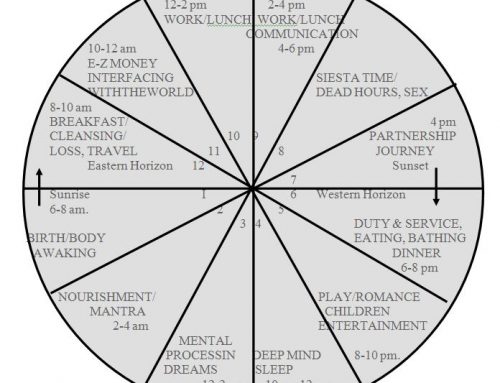Have you noticed how often soap opera and silver-screen lovers wake up in the morning and start making out? They must have very little āma and perfect agni to pull that off! (To review āma and agni, and how to know if you have it, read the ‘Breath, Poop, & Weight Test’ here.) Giving that first morning smooch with sweet-smelling breath is a great sign of health, and something we can all work up to.
But bad breath is not only lousy for lovers, it’s a sign of putrefication in the body. Common sense dictates that you cannot be a great romantic if you suffer from halitosis, poor digestion, or gas. Blotchy skin, rotten teeth, and arthritic joints are not exactly sexy. Therefore, āyurveda recommends a daily self-care routine designed to make you healthier, more attractive and energetic, whether you have a partner or are single looking to attract one.
In this blog I’ll share with you the first of 10 steps to eliminating āma and boosting health, the ‘eat all you want’ diet. (This is an excerpt from my forthcoming book, Sex, Love & Dharma)
It has become common in fitness circles to eat five to six small meals daily, in the belief that this keeps metabolism high by forcing the body to digest all day long. While this may give good results in the short term by reducing portion sizes, constantly pouring food into the body doesn’t allow any rest time for your system. As a result, āma builds up. People don’t notice āma in the early stages because exercise often accompanies such meal plans, and exercise burns āma (see below). But just like your dishwasher, you should allow your body’s digestive cycle to finish before putting anything new into it. By allowing 4-6 hours between meals, the body has time to complete digestion and then focus its energies on other matters like cleaning house, rejuvenation, and balancing your hormones. Bogging your body down with food promotes aging: fasting at least four hours between meals is anti-aging. Modern longevity research supports this as well as the health benefits of infrequent eating.
By grazing all day like livestock, we have less time to focus on other things in our lives, and our bodies don’t have full resources to devote to things like rejuvenation and burning āma. In the words of fitness guru Pavel Tsatsouline,“I don’t have time to graze” . Eating three solid meals a day may seem difficult at first but with a little practice it becomes second nature. And how good you feel when your body is not bogged down by dirty dishes all day long will make you a believer. Here’s how it’s done:
1. Start your morning with the breath, tongue, or poop test to determine if you have āma. If you do and you’re still burping last night’s meal, you may skip breakfast altogether, or have a slice of apple or other fruit. Have a tall glass of lukewarm water (as outlined in the Top Five Water Tips) and follow your morning routine. But if you won’t make it to lunch without snacking, have a light breakfast. Fruits with a scraping quality, like grapefruit or apples, are great as they stimulate peristalsis while killing your hunger. But if you eat fruit, remember to eat it alone- and especially avoid fruit and dairy- a point we’ll tackle next week. If āma is not present or if you’re really feeling hungry after your morning water, then have a hearty breakfast that will take you through to lunch without snacking.
2. At lunch, eat as much as you want! Make it the biggest meal of the day. Āyurveda says that digestion is at its peak at midday (it peaks again around midnight) and having your biggest meal between 11 am and 2 pm ensures that your body can handle all the extra nutrients. Allow yourself at least an hour for lunch, and sit and enjoy your meal. Believe it or not, relishing your food in a relaxed fashion helps not only to digest and assimilate it better, it creates fullness and satisfaction that resonates throughout your day. Just like good sex leaves you with a smile all day long, enjoying a sumptuous meal at lunchtime with few restrictions on how much to eat can have the same effect.
3. Don’t snack! The first few days it may be difficult to break this habit as it takes 48-72 hours for our bodies to adjust to this style of eating. But don’t give in, and you will see by the third day you get used to waiting for the evening supper meal with relish. Or, you may not even be hungry for dinner. Your body will make the proper adjustments and you will feel light and energetic all day without needing to reach for a snack at all.
4. Have a light supper. Dinner should not be the biggest meal of the day but it should be enough to get you to breakfast without late-night snack cravings.
5. Go to bed early, before 10 pm if possible. Between 10 pm to 2 am our body’s agni wakes up again, so to avoid those late-night snack cravings just go to bed and allow your metabolic cycle to burn āma instead. You will wake up with a cleaner tongue and more energy in the morning! If you do burn the midnight oil, no need to beat yourself up- you will get hungry. (Try drinking some warm milk or juice in that case). Āyurveda recognized this long ago and developed a special routine to avoid these little pitfalls and make the most of your day. We will see this in the next chapter.
6. Finally, take time to cook at least two to three times per week. As we’ll see in Part II, connecting to the sensuality of eating by preparing and cooking food makes you a better lover. To be sensual means to be connected to your senses, and working with the scents, tastes, sights, textures, and even sounds of your food will make you more ‘sensitive’ in every area of your life. You may even find that you eat less when you prepare your food. When all of your senses have been stimulated and filled by the process of cooking, your taste buds won’t need to make up for any lack in the other four senses. Your palate will require only what it needs and no more.
One of the reasons we overeat is because our senses are not harmonized, and we feed our need for pleasant sights, sounds, smells and sensations by eating food. Haven’t you noticed that when you’re reading a book, or listening to really good music the time just flies and you don’t notice any hunger? That is because your other senses are being sumptuously gratified to the extent that they overspill and satisfy even your sense of taste. Take some time to increase your sensitivity by exposing yourself to beauty, whether going to a rock concert or hiking the Rocky Mountains. Taking in a symphony, if you truly enjoy it, will actually help you eat less and lose weight.
Boredom is one of the main reasons for overeating. The other is stress. When you make time to stimulate your senses and divert your mind away from stress and boredom, you will need less food to combat these symptoms. Food is medicine, and we often use it to fill us up when other areas of our life feel empty. But learning to practice your dharma, and finding good company with the techniques we’ll learn in Part II will remove the need to self-medicate with food, and help you to become the best you can be!
One final note on the Three Square Meals plan is that you can use it with almost any diet. There are many good books on healthy eating. Whether you follow the Eat Right for Your Type- blood type plan or Michael Pollan’s healthy food guidelines, or a mix of two or three eating strategies it doesn’t matter: you can use them all in the context of Three Square Meals. From Paleo to The Zone to healthy vegetarian cuisine, Ayurveda as the mother of all medicine embraces individual preferences, rather than homogenizing them. It recognizes our unique cultural tastes and allows for a custom dietary and supplement program for every mind/body and dharma type.








Simon-does this way of eating also apply to someone who is extremely physical such as an athlete training or someone who does strength training with weights in combination with cardio exercise such as a High Intensity Interval Training workout program? I’m testing a program that I am really enjoying except for the eat 6 small meals a day stuff.
Hi Lara,
That’s a great question. The Three Square Meals plan can work great for athletes. It is best to start it well before training for an event so as to clean out and strengthen your digestion. During high intensity training you can add a protein/nutrient-rich shake after workouts and count this only as a drink, not a full meal. You can also make green drinks, such as apple juice with chlorella or spirulina and drink these once or twice daily for extra nutrition. They don’t count as meals either. Also, look for the other 9 tips to come- they will help to integrate the Three Square Meals plan.
Finally, water is huge- follow the 5 tips on this blog to optimize your hydration and metabolism.
Hope this helps,
Simon
Hi Lara,
As a former endurance athlete, I have found these eating habits that Simon suggests are even more important for those who are extremely physically active. I am now a coach and recommend these practices as a way to keep my athletes energized to train well. Try it!
Best,
Anne
[…] Also check out Simon’s post: 3 Square Meals-the ‘Eat All you Want’ Diet […]